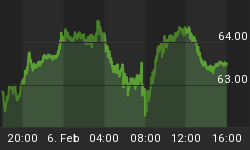In the past several weeks the stock market has given back almost all of its gains since the beginning of the year. What's surprising about this correction is that the action in stocks is completed disconnected from the outlook for the US economy. On the whole, the economy has continued to do extremely well, and the outlook remains bright.
Sooner or later the two (stock market action and economic outlook) must come into alignment. Granted, there is always the possibility that the market is predicting an economic slowdown to occur later this year or at the start of 2013. However, that goes completely against all recent data.
At this point it seems much more likely that the majority of investors simply fail to see the economic recovery that has been going on. They also clearly discount the odds of this recovery continuing. As the investing public becomes aware that the economy has picked up - and that it is likely to continue - the market should rise to meet a more optimistic outlook.
The majority of the investors, not to mention media pundits, believe that the outlook for manufacturing and industry in this country remains relatively poor. As a result, these companies (and the companies producing their raw materials, i.e. commodities) should not do well. Investing in equities - particularly industrials and commodity-related stocks - over the past several weeks and months would naturally characterize an investor as contrarian.
So it should come as no surprise that we've been called just that.
Our positive outlook on industrial and manufacturing companies is the result of substantial research into the current state of the economy, where it's likely to go, and why. This differs significantly from the tendency of most investors in reacting to the market as opposed to predicting.
A lot of time - fortunately or not - we end up moving against the majority of the investing public. This is especially true at time when the direction of financial markets or the economy is changing. At these points we and other contrarian investors tend to feel that we're swimming upstream - which certainly isn't altogether untrue.
Our goal - as should be the goal for anyone managing money for clients or themselves - should be to try to figure out what the economy is going to look like over the next 6, 12, and 24 months. From there investors need to determine which sectors of the economy will benefit from circumstances as they unfold.
The final step, naturally, is to invest in those chosen few sectors - heavily. There's absolutely no reason for investors to do all the research and legwork, and then not take full advantage.
There are a number of people and firms who do - or try to do - or profess to do - what we do. Fortunately for us, our models differ more than they typically realize.
For example, some of these investors never get fully invested in the market, much less any one area. Instead, they tiptoe through the markets; their style is full of hesitation and trepidation. We, on the other hand, refuse to wade in the kiddy pool. We have no qualms with taking our money out of the markets and sitting on the sidelines when we feel it's necessary, but when the time comes to invest, we dive in.
Then there are those who do all the research, then continue to diversify portfolios widely across sectors and asset classes. What we fail to understand is why! It's like being given the key to a vault, then refusing to enjoy the rewards.
In either case, discrepancies in practices tend to come down to a simple issue: conviction. Some have it - and can handle the market's wild swings - while others don't. Obviously it's up to every potential investor to do their own soul-searching to figure out which one they are BEFORE they dive in.















